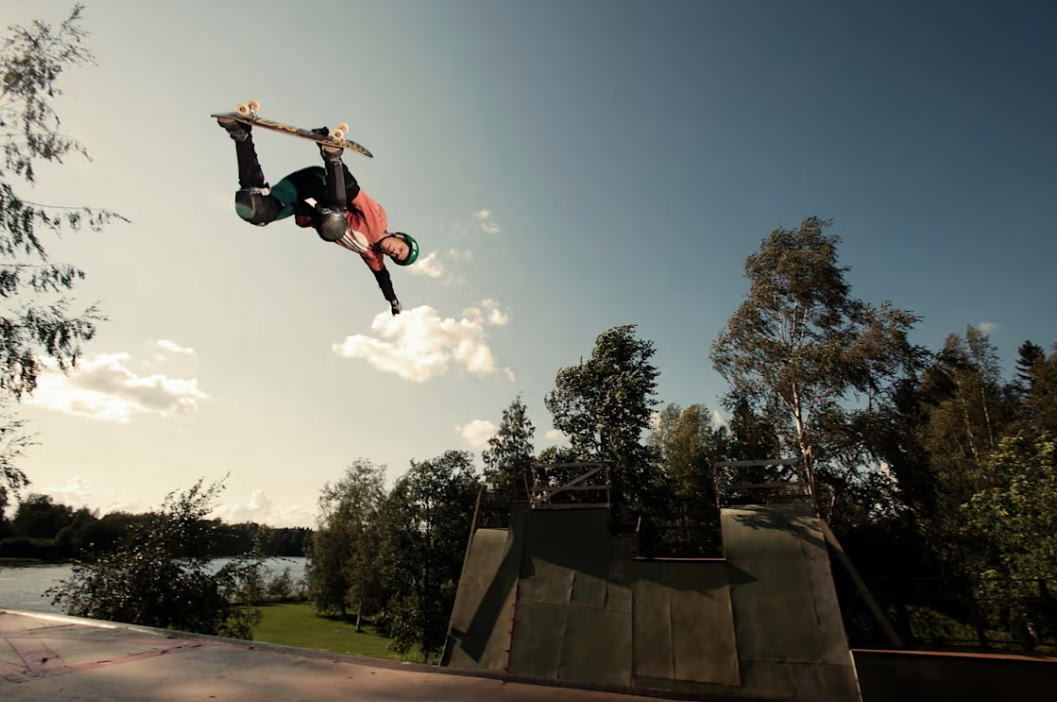The world ‘legend’ might be overused today, but I bet you’ve never heard anyone describe themselves as one- with just a single raised eyebrow, daring you to laugh.
Jussi Korhonen is not like other people. For one thing, he’s funnier than your average comedian, with that deadpan delivery and dry-as-dust sense of humour which allows himself to say such things with a straight face.
Sometimes it can be hard to profile someone you have known for a long time because there is much to say, but let’s be succinct here: like his peers Chany Jeanguenin and Juergen Horrwarth, Jussi carved out a professional skateboarding path for himself as a pioneer of the European vert scene who went into battle at the peak of the X-Games/ satellite TV/ barstool fan era of vert skateboarding as the 1990’s bled into the 2000’s.
The Finnish Park coach did it all within that period of his life- touring with bands, stadium contests, the whole post-THPS carnival.
However, he was always also a kind of detached figure within that circus, in the sense that the only thing he found attractive about that lifestyle was the skateboarding itself; due to a youth spent in Tampere as his nation emerged from behind the shadow of the Iron Curtain, Jussi has a refreshingly un-showbizy attitude to the ephemera which surrounds talented young people in their window- and the vice of self-regard it can produce. He has seen cycles of it come and go several times over, by this point.
Having returned to his native Finland where he built a backwoods mega-vert construction (as one does), Jussi has been skating hard for almost forty years now, non-stop.
For an unvarnished take on skateboarding life as he sees it, meet the man who shreds the gnar then shreds guitar: Jussi Korhonen.
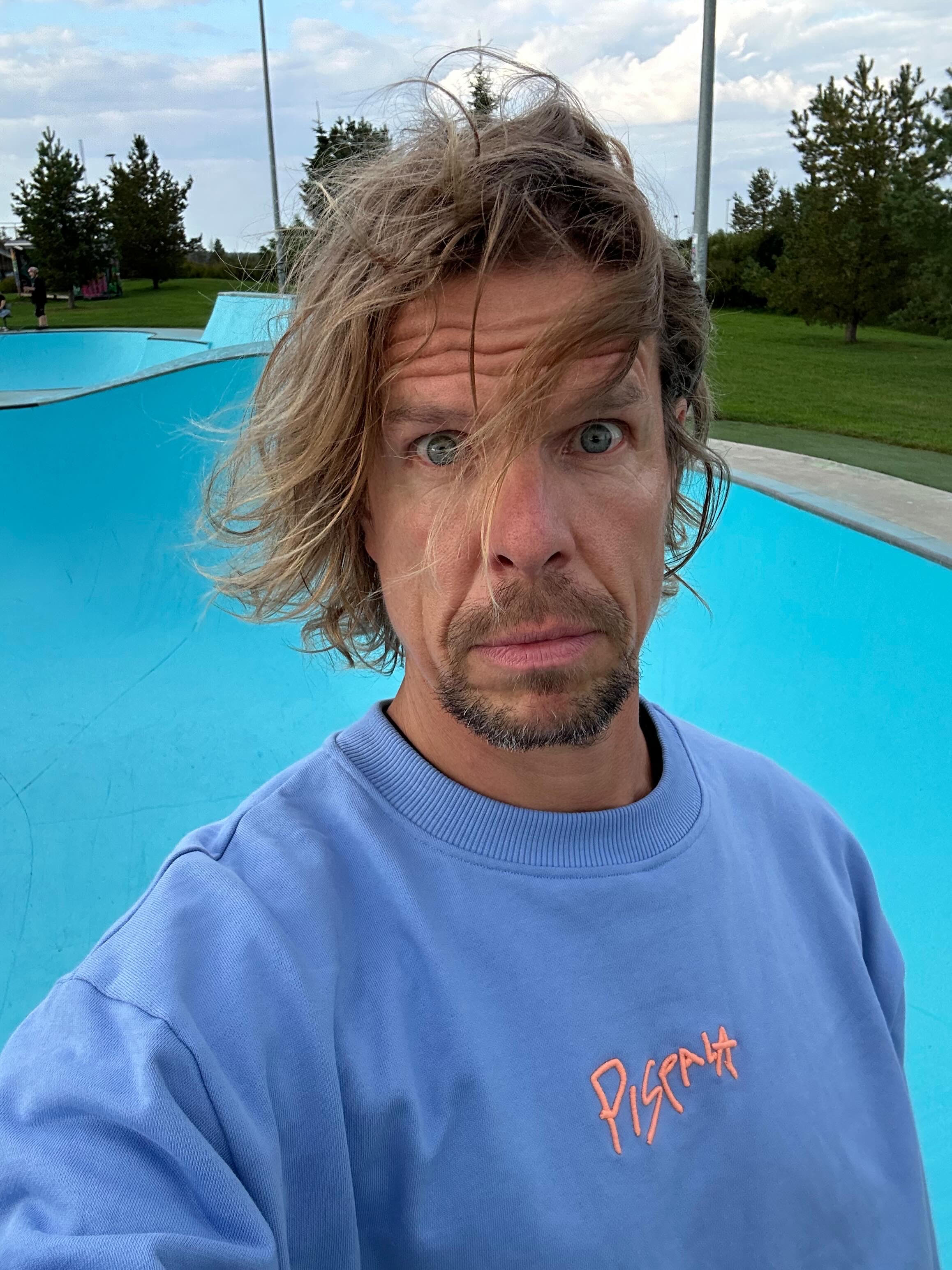
I have to ask: how does one go from skateboarding in Finland’s backcountry to being in things like the X-Games?
It’s very clear at this point. I’m blessed with certain innate gifts that ideally fit the kind of skateboarder I did become. The deal wouldn’t have been sealed unless the time and place were also aligned with my gifts. What I’ve learned about myself later on by a coaching other people: the most crucial trait of my personality in terms of skateboarding is the endless quest for exceptionality. I am creative and I have no reason to hide it. Being named ‘John Smith’ in Finnish terms wasn’t a perfect start for building a brand out of myself. I was doing OK in sports, compared to my peers. I started playing guitar when I was ten or eleven years old and learned it pretty quick. Nobody in my family played any musical instruments, but I listened to all the music I could find with my hands. There was a lot of good Pop around the mid-80’s, as you remember.
Around the same era I noticed I had some talent for the thing that would be called ‘action sports’ in the distant future. I tried BMX first. This was early 80’s. I stood out by being able to jump distances longer than any of my mates, but that was nothing too serious. It was just very easy for me. I was wondering why my mates were so intimidated.
I was not a kid with an Anglo-American background. In the late 80’s when modern skateboarding arrived on the screen in my social group and geographically speaking, we were the first ones to do it. There were no older generations of skaters around. There was nobody to judge the rights and wrongs of what we were doing. I could learn to ride my skateboard the way I wanted to. I was able to use my imagination a lot during the early years of skill progression.
Competitions were never really a thing for me. I had played hockey before I started skateboarding and I didn’t mind the competitive vibe, but I wasn’t super into it.
When I first competed locally in skateboarding around 1989-90, I realised I really liked the performing aspect of it. The bigger the crowd the better I skated. The comps and the demos became the way to share my skateboarding with other people. You skate with the best in your town. Then, soon, with the best in your country in a bigger event. Then a few months later you’ll see the how the level is in Europe, and so forth.
Although the ‘so forth’ part in my case had to wait from 1990 to 1995 once I had graduated from high school and dealt with the year of mandatory military service.
I think the reason why I ended up skating in bigger contests and demos was that those were the only situations where I could meet people who had more or less the same idea about skateboarding as me. The people who had the same discipline when it comes to practicing skills (as me). From very early on I had this funny vibe about some local skaters who had big dreams. Too big to accomplish. And they stayed as locals who had big dreams. My dreams never that big, but I was extremely hungry for action. So I went.
Finland has a strong skate scene but you are one of just a few big transition skaters from there. What challenges do you face if you want to skate big concrete in Finland?
There is some big concrete in Finland. I don’t see that a massive problem at all. You’re right, I’m probably the only Finn who consistently skated vert stuff all these years from the 80’s onwards, but I was never really involved with the DIY movement or building concrete skateparks in my country. There’s easily more people who have built concrete skateparks than people who actually ride those parks frequently. Some of the parks good, some are not. Like it happens to be everywhere.
It’s not clear to me why a backyard vert ramp is not considered DIY, but there’s is definitely a mutual goal in pouring concrete that I can relate to as a seasoned ramp owner. Another positive thing about concrete is that the annual outdoor skating season is a month or two longer than it used to be. Concrete will dry out quicker than plywood. Although what just happened this very October was that due to the long sunny autumn the bowls have had condensation on flat bottom, but the outdoor vert ramps have remained dry. It’s good to have both options.
But that’s just as far as the infrastructure goes. Then there is the cultural vacuum you can only experience when you are somebody who skates vert in a country like Finland.
I’m definitely eccentric in some ways. There's no denying it. Being the only one skating big stuff in my country for decades. Mostly skating by myself. I was always skating the ‘normal’ smaller stuff as well, but it didn’t help with fitting in socially. Actually, when living abroad, in London I managed to keep it secret in many places that I’m a vert guy. I just skated street with the locals and never touched transitions. It was fun. I didn’t trigger anyone’s insecurities.
On the other hand, there are things that I do find I really odd about my own country and it’s culture. How it’s still kept separated from most of the Western media and cultural influence. Almost like our former neighbouring country Soviet Union still existed in people’s minds and it had an effect on what people are allowed to know about the ‘Life in the West’.
Even if I’m on this creative quest for exceptionality I don’t mean to appear eccentric intentionally. I keep running into situations like this all the time. Simply because I go to skateparks and I rip. Now that there are skateparks it also means that very often you’re the only person there who skates. "Oh I've never seen a ramp that big!" I didn't even know that kind of thing existed!" or "Oh you must be crazy doing airs in bowl! I can barely drop into it!"
That’s how the ramps and bowls have been throughout the history of skateboarding. About 10+ ft tall or deep..? It should be normal by now? We are in the Olympics.
Or is it that many of the people in my country (including vast majority of skateboarding folks, too) are totally oblivious what riding a skateboard in a skatepark really means? The uninformative state must have occurred because of the national media never showed skateboarding to the masses in Finland and nobody was able to explain the phenomenon in Finnish. Tokyo in 2021- or even Heili in Paris last year- was not able break the ice. But I can smell it’s finally starting to melt. There’s no way of keeping a country totally separated from the rest of the world. In this case, skateboarding being viewed as a sport is really doing us a great favour. Helsinki is one of the few cities that have held the Olympic Games in the past. 1952 was a relatively long time ago, but it’s still echoing in our culture. Finland is very proud of it. If I observe our subculture through my first language, Finnish, it seems to me like skateboarding’s story has always had some foreign agenda within. Something else has been pushed through via showing one particular angle of skateboarding culture and leaving the actual skateboarding itself out of the story. It's been like this for forty years now, as far as I'm concerned.
Skateboarding is pretty hard to learn in the first place and ever so harder to maintain for long enough to actually understand how it works. That makes it a rare skill these days. Even more so if you happen to be good at skating vert, which has always been extremely rare. So if 99.9% of people around you don't have the slightest clue what you're up to and they have no cultural tools to measure what the oddity of yours is worth... then no wonder why you are considered eccentric!
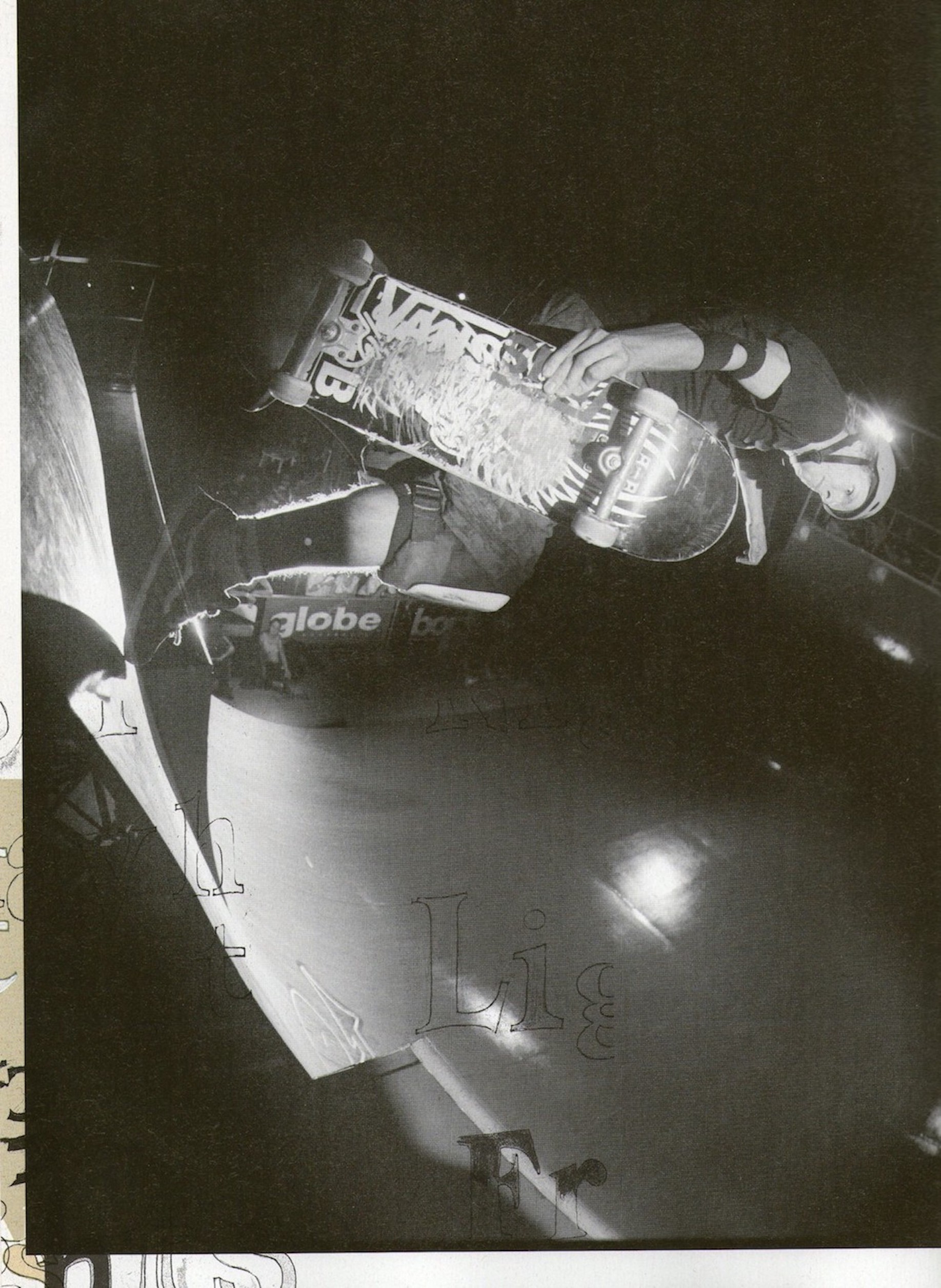
Ph: Sem Rubio/ Kingpin Magazine
Can you give us a snapshot of how busy your life was when skating was booming at live events in the post-Tony Hawk's video game era?
This is a good one. I think that was the time in my life when my weekly schedule flipped around. It has remained that way even though I have settled down a long time ago as a family man. What I mean by this is that Mondays are usually the least stressful days of the week, but then Thursday will bring a remarkable rise in the level of cortisol in my blood.
What I also learned during those busy years was that ‘my skateboarding’ happens during early afternoon and mostly by myself. When it’s a job, it’s hard to treat as leisure at the same time. You have to hack the schedule.
But I don’t think it was really that busy at all compared to my life today. The world was bigger then, for sure, and the smart phones were not there yet. But that’s exactly why it was so interesting and fun. All those random travels without knowing too much about the destination.
Does skating a Mega-ramp have benefits for your skateboarding overall, or is it almost a different discipline?
I've said this before: I feel like getting a trick done on Mega is much closer to a solving a puzzle with some specific task in street skating. If I answer your question very directly: The vert ramp is the one special discipline of it’s own, far apart of anything else, but it has a pathway to all of the other genres equally. After having my first few experiences on Mega, I noticed that my view had changed a lot more in terms of my street techniques than my vert routines.
There’s something in the way the board control works at such high velocity that is more street than vert, to me- whereas vert always has these rhythmical limitations. I have kept skating different genres of skateboarding actively and I judge things by the way they feel inside and this is how I categorise them. I’m aware that Mega looks a lot like vert for somebody who identifies as a street skater. I get it. Being able to skate vert is the best insurance you can have when going for a holiday in the Mega resort. That’s for sure.
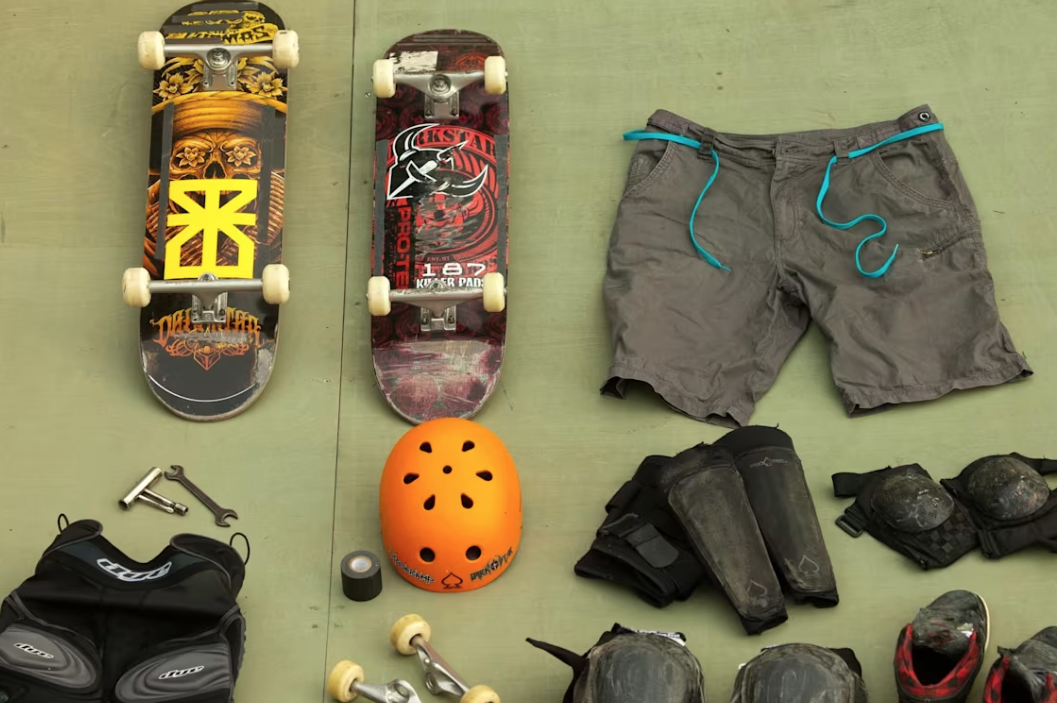
Ph: Petri Kovolainen
Is it true that lip tricks are more risky than airs on vert, because at least with airs you have time to bail?
Yes, but maybe there are multiple reasons for that. Another whole massive topic is this: if you learn the basic skills in skateboarding when you’re about nine-to-twelve years old, the aerials will be relatively easy to learn- but the lip tricks don’t necessarily work as well with a smaller body weight. Often the ten year old’s brain is already fully developed in terms of controlling the body.
So you’re basically a ‘drone version’ of your fully grown self around that age period. If you will start skating as a teenager once you’ve grown a bit taller, you have a higher risk of ending up as somebody who identifies oneself as a ‘street skater’. Then the benefit of being slightly stronger, heavier, and unfortunately clumsier too means you will probably have a better control with lip tricks. Then we can see the kind of scenarios that you described in your question.
By the way- I don’t remember seeing fully padded middle-aged skaters in the late 80’s when mini-ramps became a trend for the first time. The original function of the mini ramp was to make lip tricks easier to learn for the vert kids.
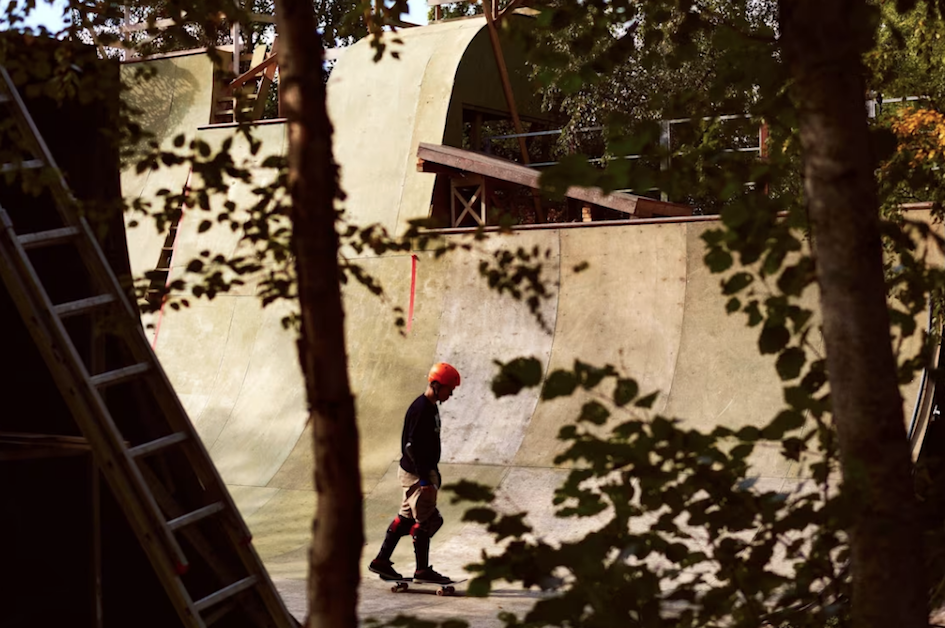
Ph: Jaakko Romu
Tell us about your time in the band Hermot with Sami Seppala? He said that every time you started playing half the people left and the other half loved it…
That was wonderful time in London. I never thought I would end up up doing that. The creative childish part of our personalities was running free. Sami had this lifelong dream of being a frontman of a Tango band. We made that dream come true. The Finnish Pop Music has a very colourful heritage. European harmonies with oriental melodies and lyrics in language that shares similar rhythm-patterns with the Latino languages.
We played some Finnish and some international Tango and Schlager classics. Few of our own originals in the mix too. We practiced a lot and played a few dozen gigs. Mostly in East London, during those five years we all lived in the area. I still keep practicing the numbers from our set occasionally. It’s possible to bring Hermot back when ever the stars collide. Anytime.
Clearly Heili Sirvio did commendably in Paris- her 5th place was less than 4 points off a podium spot- but can you tell us a little bit about Luca Karhu and Sampo Martimo who you are bringing through in Men’s Park for Finland?
Luca is a destroyer. He has always skated everything, but lately he’s focused more on Park. Now that he’s learned how to play the game, he’s one of the most powerful skaters I’ve ever seen. We’ve worked on how to press the accelerator a little more gently. He needs to be reminded that we are skateboarding- he’s got background in motocross.
Arguably there are six tricks which have made skateboarding so popular and kept us interested in it all these years. I take full responsibility for naming them here. I’m sure people will disagree with my picks and the order of them, but here we go:
- Ollies
- Kick Flips
- Rock’n’Roll Board Slides, especially down a handrail
- Inverted Hand Plants
- The 540s
- The Body Jar
Sampo Martimo just learned Body Jars. He’s sixteen and is one of the young skaters who are attending an individually tailored athlete/student program in High School. Thanks to the program and its creators he’s able travel to international contests pretty freely. I coach him several times a week for the most part of the year.
Have the Nordic nations ever considered running combined training camps in the Winter?
Yes, we have planned to. There are very few individuals, after all. Compared to more densely populated parts of the world. The long distances are kind of an issue in the Nordic region. I can’t recall one time during the past thirty years somebody from Stockholm came to skate our vert ramp. Not once. That’s the closest city that has always had a vert scene. Let’s see if the Scandi skaters will pay a visit to Tampere’s forthcoming Grip Skatepark. It will open it’s doors during Christmas Holidays 2025-’26. An indoor concrete bowl large enough to host a full scale World Skate Park contest, along with a street course, a vert ramp, and whatnot. It should be OK; even by the Swedish standards.
Given your long experience of skateboarding around the globe, what would be the best advice you would give to someone who wants to have a life in skateboarding?
Not sure if I can say I wanted this, exactly- it was more or less a coincidence. As far as I semi-consciously did choose something that became a lifestyle, I have to say this: I couldn’t resist being part of the global skateboarding community. That has always been the thing that does it for me. I’ve always felt that the community and the people in it- the people who actually skate- seem to have this inclusive vibe and mutual respect.
I’ve always been a loner individual, exploring new social territories without the shelter of having my local friends. This has been natural for a introverted personality. Which ever way it may work for you, becoming a part a such a massive and versatile community is worth a lot. It’s not about you alone or how well you perform on a skateboard. It is about what we all have in common and what we are able to express via this wonderful platform that only skateboarding can provide for us.
This isn’t exactly advice like ‘do this or think about that’, but I tried to describe the essence of it and the parts that have proven to be the most valuable to me at all times.
